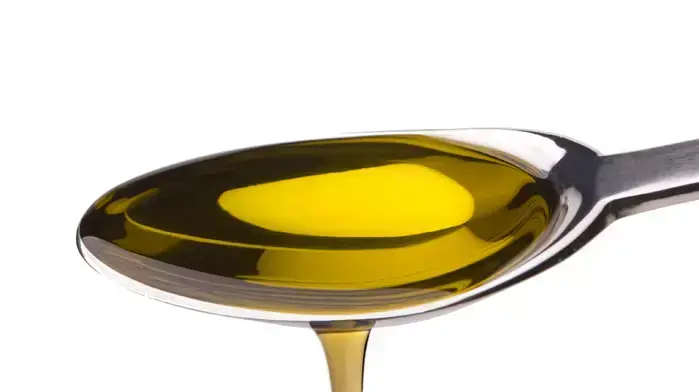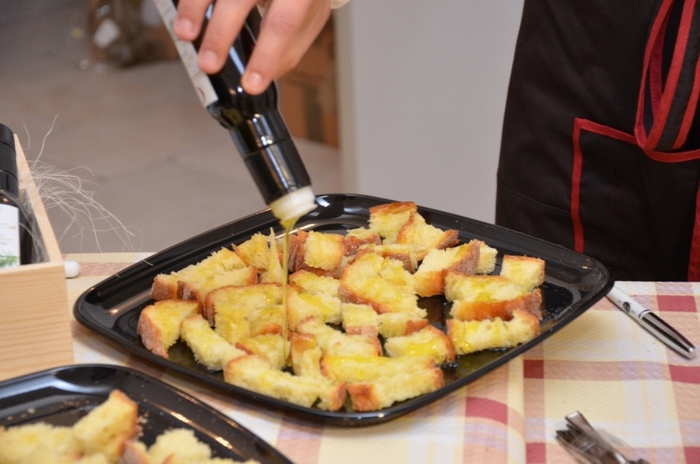young olive trees.
The industry faces massive imports, some of which are also sold to us as an Israeli brand for everything (Photo: Anat Harmoni)
At a time when the high-tech industry has become the calling card of the Israeli economy, agriculture has been pushed aside a bit, but perhaps precisely because of this it is worth turning our attention to one of Israel's flagship industries, which could have been more successful if only there had been regulation and even a little logic.
We are talking about the olive branch that could represent Israel almost as much as the branding as Start Up Nation.
Israeli olive oils receive a place of honor in international competitions and high international rankings.
In fact, the State of Israel and the local olive oil producers are in the list of the first ten countries in the ranking, with an impressive amount of wins.
Considering the fact that in Israel it is a small production level of only 20-30 million tons, about a quarter of the quantities in other countries that are considered strong in the field,
This is just proof of the level of excellence of the industry.
That's why there is nothing like the Israeli harvest season to flood the topic with which we could think outside the box.
The harvest season begins in October and lasts until the spring months, it is a beautiful time for the oil olive growers who put the difficulties aside for a moment, and present local oils from all over the country.
Today, for example, (17.3) Israel's first olive oil fair will be held in the Handiv Gardens in the Carmel Ridge.
This is an original initiative of the olive branch and the Israeli Plant Council, which brings together farmers, olive growers and textile mills from all over the country.
From the traditional olive oils of the Jashan farm that have been made in the Galilee since 1863, the desert olive oils of the Marom farm in Mitzpe Ramon, the unique oils of the 'Northern oil' produced from the fruits of an ancient olive tree plantation in the Galilee, the olive oils from the farming of Baal of the Right Farm ', the rare and award-winning olive oils of 'Bed and Sheman', 'Patorah', the Olive People, 'Magel', 'Ertez Geshur'
Ahead of the happy holiday, which also has a hint of sadness for farmers who are struggling to survive, we caught up for an interview with the manager of the olive branch for the past three and a half years, Uri Yogev (not to be confused with the former senior official at the Ministry of Finance, who was a businessman).
Yogev, a member of Kibbutz Revivim, has extensive experience in establishing olive groves, and currently he heads the olive branch that operates under the wings of the Plant Council.
Uri Yogev, manager of the olive branch at the Plant Council (photo: Private)
The sector is committed
"The olive industry for oil is a unique industry in several aspects," explains Yogev, "First of all, most of the land in Israel is non-irrigated land located in the Galilee, in the center of the country and in Judea and Samaria. There are 250,000 dunams of land, another 60,000 of irrigated land, and another 15 dunams of edible olives. Ten thousand farmers are directly employed in the industry and another 3000 are indirectly employed."
The olive branch produces about 30 thousand tons of oil every year, in 100 oil mills, with an economic value of about NIS 500 billion a year.
Ten thousand tons are produced in Baal plantations, most of them in the Arab sector.
"Arab society has a social obligation to sell oil from local production, from local oil mills and local growers. A self-respecting Arab citizen will not buy olive oil at the supermarket, but will go to the olive oil house or use the family's plantations and oils. This obligation is one of the significant reinforcements that preserve so beautifully This industry in Arab society. People understand the high demands involved in producing this oil."
So what I see in the supermarket is not a local Israeli crop?
"Most of the oil that is produced in Israel is not sold in the large marketing chains. Most of the oils on the shelves are imported, there are also Israeli manufacturers who make blends between Israeli oil and imported oil. Some market only imports, sometimes there is a label that makes you think of Zionism or settlement, but between that and oil A local olive has a very big gap."
Where does all the produce go?
"Most of the Israeli oil is sold in the institutional market, to hotels, catering restaurants or factory stores. Also in fabric stores and Teva chains of various kinds and of course online, which is a platform that we are happy to have grown greatly during the Corona period and allowed customers who until then only purchased at the supermarket to suddenly be exposed to the huge variety of olive oil from local producers small and it reaches the house."
Yogev claims that only 1,000 tons out of the 30,000 produced in Israel reach the major marketing chains, which hurts the producers, and blames the imports and the fact that the public is being misled here.
"The Ministry of Economy and the Ministry of Finance started importing olive oils in the last year in imaginary volumes of thousands of tons. The protective tariffs were lowered but they did not compromise on quality. What do you mean? They did not put a quality control mechanism
on the oils that arrive here. You have to understand that in Spain, Italy, Greece and basically Many European countries also have very large surpluses of production. From year to year there are almost 600-700 thousand tons that go from year A to year B. Now, when an Israeli producer comes and asks for cheap olive oil, he will not receive the fresh oil that is now made of high quality, but Oil that was pumped into large tanks in the past."
Some will say that they know what they are doing and there is no reason why the oil should not be kept well
"They know how to keep it under ideal conditions, but it is still the least fresh oil. Olive oil does not improve over time, unlike wine, its taste and quality slowly wears off. It should be consumed fresh."
More in Walla!
A smart test detects an increased risk of stroke - now on special sale
Served on behalf of Shachel
Olives from the Land of Israel.
The olive industry demands that the Ministry of Economy stop misleading consumers (Photo: Anat Harmoni)
quality mark
But this is not the only problem according to Yogev, like the missing quality note.
"In Spain, Greece and Italy, for example, when you look at the shelves in the marketing chains, you see a number and a quality rating. The super virgin symbol, which is a symbol of the highest level of wine, ordinary virgin olive oil or olive oil, which is a blend consisting of refined oils and naturally produced virgin oils. There, too, the price for a superior virgin is the highest More, and in Israel, if you pay attention, all the stickers say that this is an excellent virgin. This is not the case with imports."
Yogev claims that the industry asked the Ministry of Economy to check the oils that are imported at cheap prices to Israel, some of them have a defective taste "No one checks it. You put pressure on the marketers to import the cheap, so bring both and the audience will decide what they want to buy, whether ordinary For oil that is intended for frying and cooking or extra virgin, the consumer should be aware that the cheap oil he buys is not of the best quality. In my view, this is the deception that harms Israeli production."
Where is the regulation?
"We also contacted the Food Service of the Ministry of Health and asked them to address the issue, they referred us to the Food Association who understand our claim but have no resources, and more precisely they devote their limited resources only to what relates to health damage to the public. I went to the Consumer Protection Authority, spoke to them and told them that there is a deception here A huge consumer.
The public buys oil that it thinks is an excellent grade and in fact has some defective flavors. They claimed in response that they do not check the content of a product but only the food service, and they are responsible for validity labels and so on.
So we are trying to connect the food service with the Consumer Protection Authority, between the regulators for cooperation and call on them to please, cooperate, check these qualities and protect the public, this is part of your job."
The European market generously subsidizes local agriculture, explains Yogev, "In Spain alone, about 30 million dunams of olives are cultivated annually. In Israel as a whole there are only 21 million dunams. Spain is responsible for half of the global production, which is one and a half million tons, followed by Italy, Greece, Tunisia , Morocco and Turkey".
Israel is a small drop in the hand, without local agricultural subsidies.
"We cannot deal with low prices. When you buy oil in Israel at the expensive price levels, it is because, first of all, the cost of water in Israel is higher than the cost in Spain. The cost of labor in Israel, energy, electricity, etc. are more expensive and let's not forget the kashrut, unlike the oil houses abroad "For those who work 7 days a week 24 hours every day, in Israel the textile houses work five and a half days, and we have so-called mitzvot that depend on Israel such as: Arla, Shemita, etc.." Maintaining kosher is a requirement
of a significant part of the market. Looking for the cheapest price?
"The majority of the population that is looking for kosher is not the population that is looking for the expensive oil and this is proven in the field. So we cannot ignore the peripheral consequences that the need for kosher burdens the work, but I don't want to focus only on that."
Yogev puts his finger precisely on the great dissonance between what is happening in Israel and what is happening in the world in the last year.
"There was a terrible drought in Europe, and extreme changes in the weather that caused an equally dramatic drop in the harvest. Spain and Italy produced in the past year about half! of their normal amount, which caused a dramatic increase in the wholesale price of olive oil in the world, which reached 6 euros per kilo in Spain and Italy. You have to Understand that during the most expensive periods, the price of oil did not exceed 3 euros per kilo at the maximum."
Is this perhaps good news for the local manufacturers as well?
"Perhaps in the future. Right now in Israel the prices are still cheap, because these are products that are on the shelves from deals made six months ago or more. Unfortunately, there are still oils here with major defects in taste that the public doesn't even have the opportunity to differentiate between the quality oils and the lower quality ones."
What can be done to win?
"One of our tasks is to operate a quality mark club. The fingerprint that essentially all Israeli oils that are tasted blindly will receive a quality mark, if they pass the criteria. We will only represent oils that meet our standard and the standard, and this is what will improve the produce. Another thing that farmers need It's stability. A farmer who plants trees needs 4 years until the trees start yielding, and 3 more until they reach their peak yield. In Israel, three governments have already changed, and the price of water has gone up, the market price that depends on the protective tariffs has gone down, because the protective tariffs were abolished, so it's difficult It is very important for farmers to understand what is happening."
Olive tree.
Is one of the oldest branches of Israeli agriculture in danger? (Photo: Anat Harmoni)
uproot planted
One of the side effects seen in the field is the stopping of planting.
"People feel on the fence. The big planters are talking about ceasing planting, which is a very serious thing, because plantings need to be renewed all the time. Farmers with thousands of dunams of tens of thousands of trees in the Negev, in the Valley of the Springs, for example, raised their hands. They say, how much longer can we wait and wait for a year A favor where you can make a living?"
Everyone talks about the cost of living, so the farmers pay part of the price
"There is something more psychological about the price of olive oil that is a little misleading. When a person buys wine, there is a quality mark. When you buy a bottle of wine, the wine usually ends with the same meal. In the case of olive oil, the prices are not similar and Not the use, a bottle for NIS 50 is enough for you for twenty meals. So the weight of the bottle in the shopping basket is much smaller, so the price issue is different.
And again, you will understand that there are better quality oils and there are lesser ones.
And not everyone can bear the title of excellent virgin.
We guarantee the degree of quality.
And our producers are not able to deal with the price differences in the marketing chains, so we hope that this fair will open up to consumers who usually shop at the grocery store near their home, the possibility to understand that there is good produce and it is also accessible a click away."
Of money
Tags
Olive oil
Cost of living
Olive Harvest








